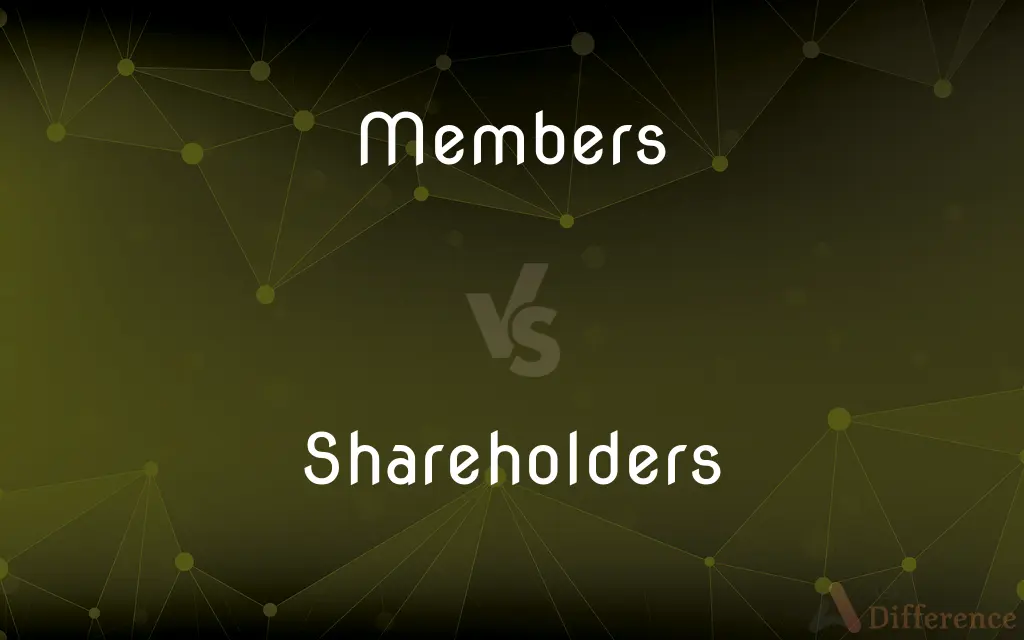Members vs. Shareholders — What's the Difference?
Edited by Tayyaba Rehman — By Fiza Rafique — Published on December 15, 2023
Members are individuals or entities belonging to a group or organization, while Shareholders are individuals or entities owning a portion of a company's stock.

Difference Between Members and Shareholders
Table of Contents
ADVERTISEMENT
Key Differences
Members often refer to those who belong to a particular group, organization, or club. On the contrary, Shareholders are specifically related to corporations, indicating ownership of shares.
A club or society would typically consist of Members who might have joined because of a shared interest or goal. However, Shareholders are a part of a company due to their financial investment and expect returns.
Members generally have rights in accordance with the group's constitution or by-laws. Shareholders, in contrast, have rights in line with the amount of stock they own, often including voting on corporate matters.
In some contexts, notably cooperatives, the word Members might also denote ownership or a stake in the organization. Yet, Shareholders explicitly suggest ownership in the form of shares in a for-profit company.
When discussing nonprofit organizations or clubs, the term Members is more applicable. For profit-driven corporations, Shareholders is the suitable term, given it revolves around share ownership.
ADVERTISEMENT
Comparison Chart
Associated With
Groups, organizations, or clubs
Corporations
Indicates
Belonging to a group
Ownership of shares
Rights Based On
Constitution or by-laws of the group
Amount of stock owned
Expectation
Shared interests or goals
Financial returns
Typically Found In
Nonprofit organizations, clubs
Profit-driven corporations
Compare with Definitions
Members
Subscribers or participants of a service or system.
The gym offers a discount to its premium Members.
Shareholders
Investors holding equity in a business.
Shareholders were pleased with the quarterly profit announcement.
Members
Entities included in a particular set.
Several countries are Members of the United Nations.
Shareholders
Stakeholders in a corporation based on share ownership.
Shareholders voted on the new merger proposal.
Members
Individuals belonging to a group or organization.
The chess club has over 100 Members.
Shareholders
Individuals or entities owning shares in a company.
The company held an annual meeting for its Shareholders.
Members
Individuals holding a specific position within an organization.
The board consists of ten Members.
Shareholders
Individuals with a vested interest in a company's financial performance.
The Shareholders expressed concerns about the company's new strategy.
Members
(Linguistics) A syntactic unit of a sentence; a clause.
Shareholders
Those entitled to dividends based on shares owned.
The company declared a dividend payout for its Shareholders.
Members
(Logic) A proposition of a syllogism.
Shareholders
One that owns a share or shares of a company or investment fund. Also called shareowner.
Members
(Mathematics) An element in a set.
Shareholders
Plural of shareholder
Members
A limb, such as an arm or a leg.
Members
The penis.
Members
A part of a plant.
Members
One that belongs to a group or organization
A club member.
A bank that is a member of the FDIC.
Members
(Mathematics) The expression on either side of an equality sign.
Members
A structural unit, such as a beam or wall.
Members
Plural of member
Members
Individuals affiliated with a specific group due to certain criteria.
Only Members of the alumni association can attend the annual reunion.
Common Curiosities
Are all Members of an organization also Shareholders?
No, being a Member doesn't necessarily imply share ownership.
Can Shareholders sell their shares?
Yes, Shareholders can typically sell their shares unless there are restrictions.
Is there a limit to how many Shareholders a company can have?
It depends on the company type; for example, private companies might have limits.
Can someone be both a Member and a Shareholder?
Yes, in organizations like cooperatives, Members might also be Shareholders.
Do Members always pay to join a group?
Not always, membership criteria vary by organization.
Which has a financial implication, being a Member or a Shareholder?
Being a Shareholder, as it denotes ownership and potential financial returns.
Do Shareholders always have a say in company decisions?
Typically, Shareholders have voting rights based on their share amount, but it varies by company and share type.
Do all Members have voting rights within their organization?
It depends on the organization's by-laws or constitution.
Is membership in a group always formal for Members?
No, membership can be informal or formal based on the group.
Do Shareholders have a say in day-to-day company operations?
Typically, no; Shareholders usually vote on broader corporate matters.
Share Your Discovery

Previous Comparison
Lactic Acid Fermentation vs. Alcoholic Fermentation
Next Comparison
Small Intestine vs. Large IntestineAuthor Spotlight
Written by
Fiza RafiqueFiza Rafique is a skilled content writer at AskDifference.com, where she meticulously refines and enhances written pieces. Drawing from her vast editorial expertise, Fiza ensures clarity, accuracy, and precision in every article. Passionate about language, she continually seeks to elevate the quality of content for readers worldwide.
Edited by
Tayyaba RehmanTayyaba Rehman is a distinguished writer, currently serving as a primary contributor to askdifference.com. As a researcher in semantics and etymology, Tayyaba's passion for the complexity of languages and their distinctions has found a perfect home on the platform. Tayyaba delves into the intricacies of language, distinguishing between commonly confused words and phrases, thereby providing clarity for readers worldwide.












































